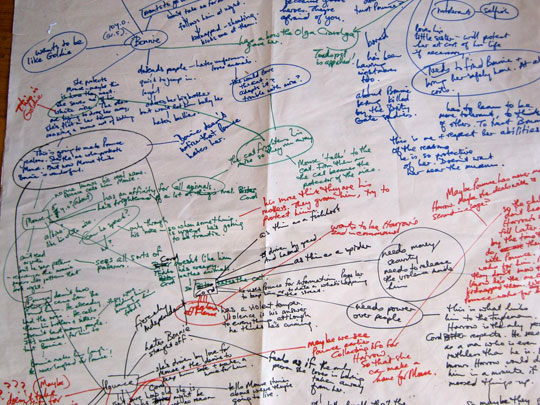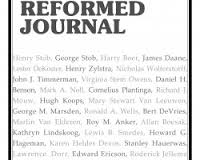“I never want to attend another meeting with large sheets of newsprint on the wall and colored markers on the table.”
Couldn’t we all agree? How many times do we need to brainstorm about mission and vision and values? Yet wouldn’t we half-begrudgingly agree that some of this work is probably necessary, dare I say, even helpful?
I think of this as I reflect back on “A Rant Directed at Our Readers,” a post by Jeff Munroe a couple weeks ago, as well as the many editorial board meetings for Perspectives I have been party to. “Who are we? Who are our readers? What does it mean to be Reformed? What is our perspective?” Questions like these filled hours of our time and numerous newsprint sheets stuck to the wall. We never quite nailed it. We could sense it, but never fully articulate it.
For The Twelve to covet “likes” and “shares” and hoping  to incite ranting responses is just one more symptom of that age-old Reformed malady of envying Baptists and being overawed by Pentecostals, wishing we too had weepy conversion tales and dramatic accounts of miracles, not to mention viral blog posts. If only… If only The Twelve would blog more about lust and yoga pants. (Google it!)
to incite ranting responses is just one more symptom of that age-old Reformed malady of envying Baptists and being overawed by Pentecostals, wishing we too had weepy conversion tales and dramatic accounts of miracles, not to mention viral blog posts. If only… If only The Twelve would blog more about lust and yoga pants. (Google it!)
And we’re hamstrung too by that Belgic Confession ethos that tells us “not to push ourselves forward” (article 31). We aren’t even the new cool, chauvinistic, combative “reformed.” These recent converts have that zealous, sharper edge. Most of our writers (and readers) could be labeled, “aged and mellowed in oak barrels for 18 years”—unexciting evidence that sometimes “covenant theology” actually works.
18 years”—unexciting evidence that sometimes “covenant theology” actually works.
Three Adjectives
“Tribal” is a term often villainized as synonymous with balkanized, provincial, and pedantic. I’ve always liked the term. For me, it conveys a confident identity, roots, a perspective. Years-ago Martin Marty, a true scholar and gentleman, blurbed for Perspectives something to the effect that few journals were as capable in drawing upon their heritage to address contemporary culture. I like that to think is still true. Are we too white, too Dutchy, too USA-centric? Of course. But realizing you are a tribe and that your tribe, like all tribes, has blessings and blind spots, fortes and foibles, might help cover at least a few of our flaws.
When we’re in one of our newsprint and colored-markers frenzies, a term that often comes up—or is made up—is “institutionalists.” We are people who have been shaped by, value, and participate in pretty traditional institutions. We’re pastors of congregations and professors at small colleges. We live within those confines, those responsibilities, those relationships.
I think we remind ourselves of our institutionalism because we don’t want to be hand-grenade-tossers, rebels, radicals, or trolls. We don’t aspire to shock or annoy. Even to try to be provocative or prophetic feels too self-important. If we unintentionally end up sometimes being prophetic or provocative, that’s okay. We’d prefer the role of the loyal-opposition; not seeking to detract and tear down, but to broaden the conversation, to strengthen and invigorate the institutions we love. Still, we live in a fractious society, where institutions are told to “speak with one voice,” so that some will only hear the opposition and overlook the loyalty.
radicals, or trolls. We don’t aspire to shock or annoy. Even to try to be provocative or prophetic feels too self-important. If we unintentionally end up sometimes being prophetic or provocative, that’s okay. We’d prefer the role of the loyal-opposition; not seeking to detract and tear down, but to broaden the conversation, to strengthen and invigorate the institutions we love. Still, we live in a fractious society, where institutions are told to “speak with one voice,” so that some will only hear the opposition and overlook the loyalty.
Another descriptor we’ve used for ourselves (only behind closed doors because it doesn’t seem very becoming) is “middle brow.” Neither highbrow nor low. We strive to be accessible, relevant, real-world, but not simplistic, sloganistic, or maudlin. We want to be incisive, curious, and honest, but not stuffy, convoluted, or pretentious. It is a difficult mark to hit. The comments that tell me we’re doing okay are when one of you tells me  “Someday I hope to read the entire Church Dogmatics or everything by Flannery O’Connor, but for now Perspectives and The Twelve help me to have a little bit more on mind than the laundry, Little League, and staff meetings.”
“Someday I hope to read the entire Church Dogmatics or everything by Flannery O’Connor, but for now Perspectives and The Twelve help me to have a little bit more on mind than the laundry, Little League, and staff meetings.”
Ewgh, Politics!
An offhanded remark by an outsider can sometimes give you more insight into yourself than all the newsprint in all the meeting rooms. Skimming through Tim Keller, I believe it was Center Church, I found something like this, “Perspectives is a journal of politically progressive Calvinists…”
At first you want to protest, “That’s not fair…We’re so much more than that.” But then you open to the possibility that’s how a pretty dispassionate observer sees you. Maybe you should listen. Maybe there is something there.
I resist Keller’s description because we don’t want to be pigeonholed and dismissed. To be political, as we all know, is to be divisive, contentious, inflammatory. But you don’t have to read Perspectives or The Twelve for very long to realize that Keller is on to something. Not every writer. Not all the time. In other words, we don’t overtly write on “politics” very often. Sometimes we just can’t help ourselves. See Jim Schaap’s recent “Clovis, TR, and WWJD” or my “Birth Control, Religious Freedom, and Obamacare.”
Does the politics of much of The Twelve lean left? No doubt. But what we don’t want to do is push away those who do not fully share this politics. We want to be conversationalists and bridge-builders. We want readers to engage, respond, debate, not write us off as the lunatic fringe. 
As much as we want to be more than “political,” and wider than “progressive,” there is also a way we should honor and own that as part of our heritage. The lionized Reformed Journal, which we claim as our hallowed ancestor, made its name advocating for women in church leadership, standing up for civil rights, questioning Vietnam, being an early voice for creation care, and later poking at the evangelical alliance with Reagan’s Republicans. They did so thoughtfully, mostly mildly, and almost always informed by their Reformed heritage. But don’t think there wasn’t anger and uproar over what they wrote. Like Perspectives and The Twelve today, the Reformed Journal didn’t only speak to politics. The drumbeat was steady, but not stifling.
Yes, we want you to like us. We value you as readers and conversation partners. We want to matter. We want your likes, your shares, your comments, your subscriptions—even your contributions.

